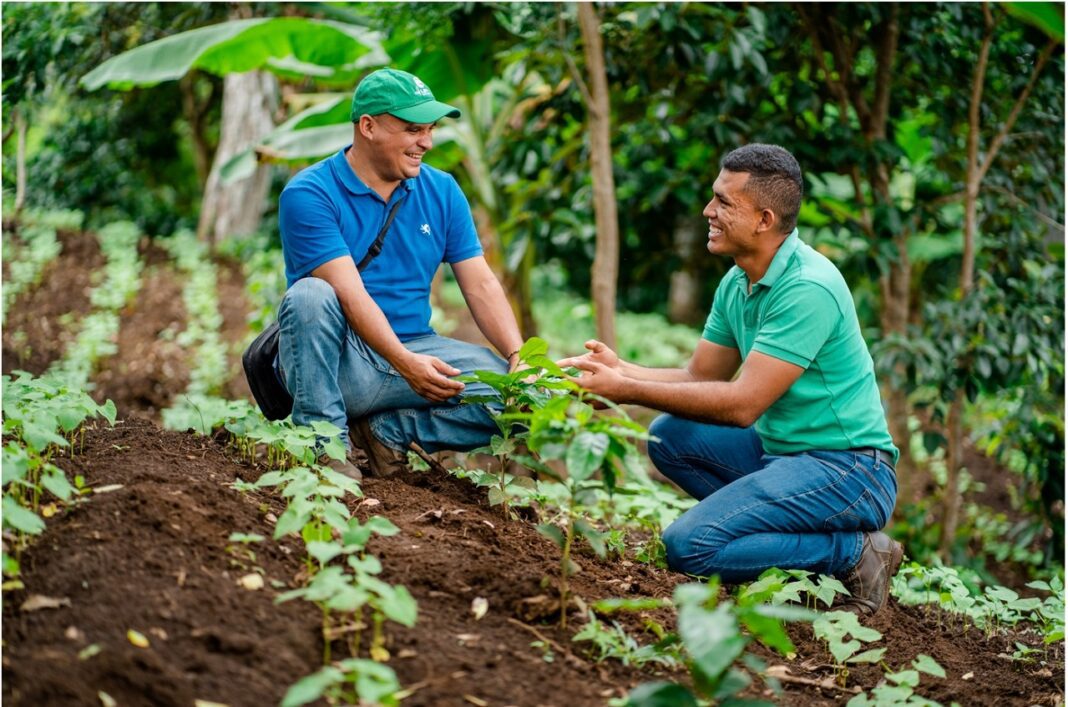HELSINKI, Finland – Paulig ’s and K Group’s successful sustainability campaign has reached the coffee farms. 84,000 new coffee trees and 2,000 shade trees have now been planted in the village of Jose de la Luz in Nicaragua. The new coffee trees improve the productivity of 15 coffee farms significantly, and the shade trees support the maintenance of biodiversity, improve soil quality as well as curb erosion and water evaporation at plantations. Shade trees also act as carbon sinks to fight climate change.
The cooperation campaign supports the implementation of climate action in the sustainability programmes of both Paulig and K Group. As a sustainable frontrunner in the food and beverage industry Paulig has adopted ambitious science-based climate targets. By 2030, Pauligs aims to reduce the greenhouse gas emissions from its own operations by 80% and from its value chain by 50%.
On top of that, the company sources all its coffee beans from verified sustainable sources and roasts Finns’ favourite coffees in carbon-neutral roasteries. Paulig also invests in packaging development and projects that promote circular economy; for instance, they recycle coffee beans into new ingredients for the cosmetics industry and functional food through their partner.
“We want to operate sustainably, mitigate climate change and respect biodiversity. Through our sustainability projects we aim to ensure that future generations can also enjoy their coffee moments with a good aftertaste”, says Paulig’s Sustainability and Public Affairs Director Lea Rankinen.
“At the heart of our sustainability work is mitigating climate change, preventing environmental degradation and enabling a sustainable lifestyle for our customers. We’re delighted by the enthusiasm of the K grocery store customers to join in to support sustainable coffee cultivation. Our aim was to plant 70,000 tree seedlings, but through our collaboration we were able to plant over 86,000 new coffee and shade trees in the country of origin of coffee’’, says Timo Jäske, Sustainability Director for Kesko’s grocery trade division.
The coffee farmers benefitted are Paulig’s partner farmers and they participate in Mercon’s LIFT platform, focused on supporting producers to have profitable production levels by using resources efficiently through the adoption of environmentally friendly and socially responsible agricultural practices.
“Around 90% of the residents of San Jose de la Luz earn their livelihood from coffee. We would like to thank Finnish coffee lovers for making sustainable choices. With the new trees, the vitality of our coffee farms has increased, and future crop prospects are better, says coffee farmer Aurelio López Pozo.
You can and should act sustainably in your home kitchen as well
In coffee production, the second largest impact on the climate is the coffee being prepared and enjoyed, and coffee waste amounts to approximately 13% of households’ annual food waste. This means that a coffee-drinking Finn pours almost 2.5 litres of coffee down the drain every year. You can save energy and reduce food waste significantly by utilising these climate-friendly coffee-making tips.
Climate-friendly tips for making coffee:
- Reduce wastage: do not make more coffee than you are going to drink. If you make a lot of coffee at once, pour the coffee into a thermos. The coffee will retain its fresh taste in the thermos for half an hour. You can also freeze excess coffee into coffee ice cubes that are perfect for cooling down a hot coffee beverage or to be enjoyed as they are, with milk, for example. In addition, coffee can be used in different dressings, dips and baking.
- Save electricity: Switch off your coffee maker once the coffee is ready. Don’t let the coffee sit in the coffee maker.
- Recycle used coffee grounds: compost the used coffee grounds or discard them in the biowaste bin – if you have a rose bush in your garden, you can throw the used coffee grounds under the bush. In winter, you can use coffee grounds for gritting roads. Coffee grounds are also suitable for beauty care as they can be used to exfoliate the skin, for example.
- Washing up: wash the coffee cups and coffee pot in a dishwasher, and wash only when the dishwasher is fully loaded.
- Recycle or reuse the coffee packages: The laminated package is made of highly durable material that can be transformed into all sorts of useful things, such as shopping bags, bread baskets, jewellery or other decorative objects. If you will not use the coffee package in your arts and crafts, sort the empty coffee package in the plastic waste bin.
















